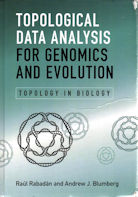Biology has entered the age of Big Data.
A technical revolution has transformed the field,
and extracting meaningful information from large biological data sets
is now a central methodological challenge.
Algebraic topology is a well-established branch of pure mathematics
that studies qualitative descriptors of the shape of geometric objects.
It aims to reduce comparisons of shape to a comparison of algebraic invariants,
such as numbers, which are typically easier to work with.
Topological data analysis is a rapidly developing subfield
that leverages the tools of algebraic topology
to provide robust multiscale analysis of data sets.
This book introduces the central ideas and techniques of topological data analysis
and its specific applications to biology, including the evolution of
viruses, bacteria and humans, genomics of cancer,
and single cell characterization of developmental processes.
Bridging two disciplines, the book is for researchers and graduate students
in genomics and evolutionary biology as well as mathematicians interested in applied topology.
